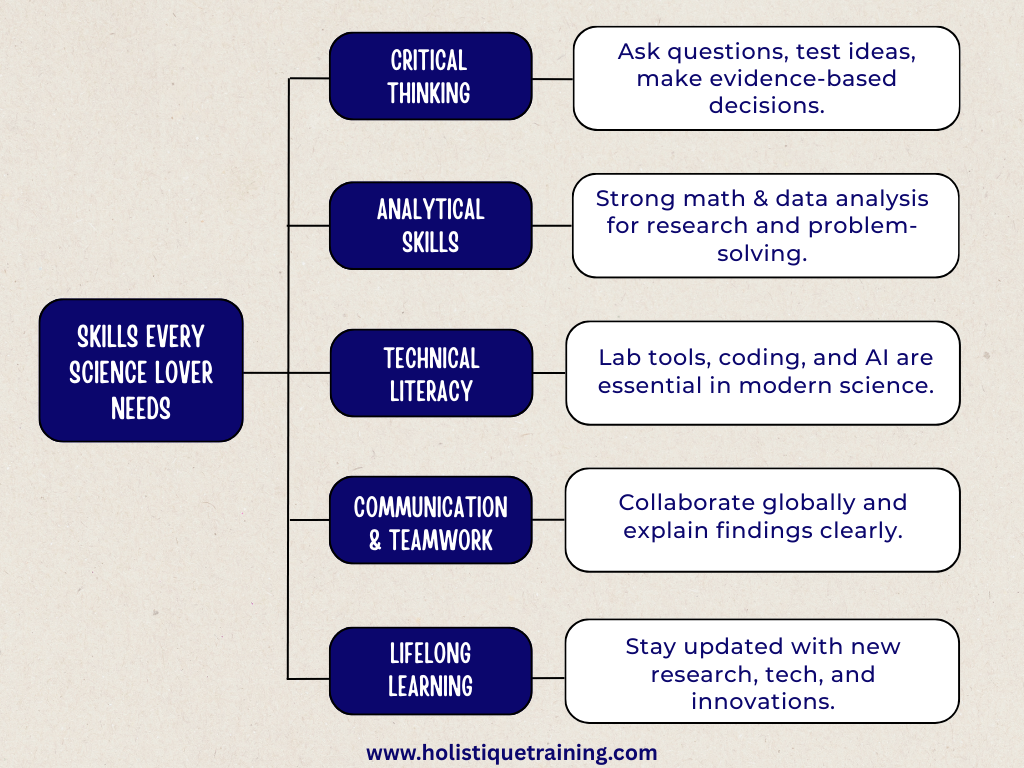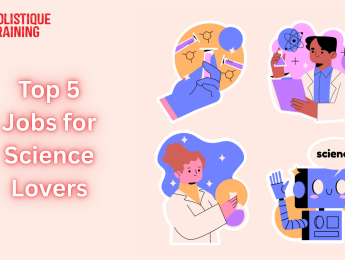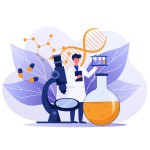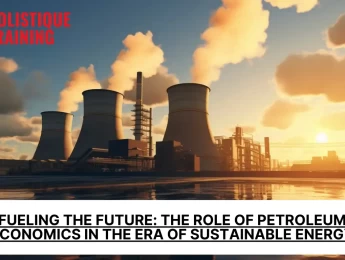- Table of Contents
- 1. Introduction
- 2. Why Choose a Science Career?
- 3. The Top 5 Jobs for Science Lovers
- 1. Biomedical Scientist
- 2. Environmental Scientist
- 3. Data Scientist (in Scientific Fields)
- 4. Research Scientist (Physics/Chemistry)
- 5. Science Communicator / Journalist
- 4. Skills Every Science Lover Needs
- 5. Education & Career Pathways
- 6. Future of Science Careers
- 7. Conclusion
1. Introduction
Science has always been at the heart of human progress. From discovering life-saving medicines to developing sustainable energy solutions, science careers shape the way we live and think. For those who are curious about the world, science offers a rewarding path filled with endless opportunities to explore, experiment, and innovate.
One of the most exciting aspects of a science career is its ability to connect passion with purpose. Unlike many professions, science is not just about earning a living—it is about making a difference. Scientists are behind breakthroughs that improve health, protect the environment, advance technology, and solve global challenges. Whether through studying microorganisms in a lab, analysing climate data, or developing AI models for medical research, science professionals contribute to shaping a better future.
What makes these careers especially appealing is their combination of curiosity, innovation, and problem-solving. Every experiment, research study, or scientific communication effort begins with a question and ends with knowledge that benefits society. This cycle of inquiry and discovery keeps science careers dynamic, meaningful, and future-proof.
In this article, we will explore the top five jobs for science lovers that offer both intellectual satisfaction and professional growth. These include:
- Biomedical Scientist – advancing human health and diagnostics.
- Environmental Scientist – protecting our planet and promoting sustainability.
- Data Scientist in Scientific Fields – unlocking insights from complex data.
- Research Scientist in Physics or Chemistry – driving innovation in technology and industry.
- Science Communicator or Journalist – bridging science and society.
Together, these careers highlight the diverse opportunities available to science enthusiasts who want to combine passion with impact.
2. Why Choose a Science Career?
Science careers are uniquely rewarding because they allow individuals to satisfy their intellectual curiosity while contributing to the greater good. For people who love asking questions, seeking evidence, and solving problems, science provides an outlet for continuous discovery.
Beyond curiosity, science plays a vital role in improving society. Biomedical research saves lives through better treatments. Environmental studies help us adapt to climate change. Advances in chemistry, physics, and data science power industries ranging from renewable energy to artificial intelligence. Each discovery contributes to human well-being, environmental protection, and technological innovation.
Another compelling reason to choose science is the variety of career paths it offers. Unlike fields with limited trajectories, science provides multiple avenues: research, industry, policy-making, teaching, or science communication. Whether someone prefers working in a laboratory, in the field, with communities, or in media, science accommodates all personalities and ambitions.
Finally, science careers are supported by high demand and job security. According to the U.S. Bureau of Labor Statistics (2023), employment in STEM (science, technology, engineering, and mathematics) occupations is projected to grow 10.8% between 2022 and 2032, much faster than the average for all occupations. Similarly, the UNESCO Science Report (2021) highlights that global investment in research and development continues to rise, creating more opportunities for trained scientists.
Table: Why Choose a Science Career?
Reason | Key Benefits | Examples |
Intellectual curiosity | Constant learning & discovery | Research in genetics, space exploration |
Contribution to society | Real-world impact | New medicines, renewable energy |
Variety of career paths | Options across industries | Academia, policy, communication |
High demand & security | Strong job market & salaries | STEM fields projected growth >10% |
Science is not just a profession—it is a journey of curiosity, purpose, and impact.
3. The Top 5 Jobs for Science Lovers
1. Biomedical Scientist
Biomedical scientists play a crucial role in modern healthcare by diagnosing diseases, developing treatments, and advancing medical research. Working in laboratories, they study blood samples, tissues, and microorganisms to help doctors identify illnesses and design appropriate treatments.
Daily Responsibilities:
- Conduct laboratory tests on patient samples.
- Research new diagnostic tools and treatments.
- Collaborate with doctors, nurses, and public health professionals.
- Ensure quality control and laboratory safety.
Required Education & Certifications:
- A bachelor’s degree in biomedical science, biology, or a related field.
- Many roles require postgraduate study (Master’s or PhD).
- Certifications from bodies like the Institute of Biomedical Science (IBMS) in the UK or American Society for Clinical Pathology (ASCP) in the U.S. enhance employability.
Key Skills:
- Analytical thinking.
- Laboratory techniques and attention to detail.
- Communication for presenting results.
- Ethical and safety awareness.
Industries Hiring:
- Hospitals and clinical labs.
- Biotechnology and pharmaceutical companies.
- Research institutions and public health organisations.
Salary Outlook & Future Trends:
According to the U.S. Bureau of Labor Statistics , medical scientists earn a median annual wage of $99,930 (2023). The demand for biomedical scientists is expected to grow steadily due to rising healthcare needs, aging populations, and advancements in biotechnology. Future trends point to precision medicine, gene therapy, and AI-driven diagnostics.
2. Environmental Scientist
As climate change, pollution, and sustainability challenges grow, environmental scientists have become essential professionals. They study how human activities affect the natural world and propose solutions to mitigate environmental damage.
Daily Responsibilities:
- Conduct field studies on air, water, and soil quality.
- Use lab analysis to identify pollutants.
- Develop environmental policies and sustainable practices.
- Collaborate with governments, NGOs, and industries.
Required Education & Certifications:
- A bachelor’s degree in environmental science, ecology, or geology.
- Specialisation at the Master’s or PhD level for advanced research roles.
- Certifications such as Certified Environmental Scientist (CES) can be valuable.
Key Skills:
- Data analysis and critical thinking.
- Fieldwork techniques.
- Policy interpretation and communication.
- Knowledge of GIS (Geographic Information Systems).
Industries Hiring:
- Environmental consulting firms.
- Governmental agencies (e.g., EPA, UNEP).
- Renewable energy and urban planning sectors.
- Conservation organisations.
Salary Outlook & Future Trends:
The median annual wage for environmental scientists in the U.S. was $76,480 in 2023. Demand is projected to grow by 6% through 2032 due to sustainability efforts. Future trends include renewable energy development, sustainable urban planning, and climate modelling.
3. Data Scientist (in Scientific Fields)
Data has become the new oil of the scientific era. Data scientists apply statistics, programming, and AI to unlock insights from massive datasets in genetics, space research, and climate science.
Daily Responsibilities:
- Clean, analyse, and visualise scientific data.
- Develop machine learning models for prediction.
- Collaborate with researchers to interpret findings.
- Present results to both scientific and non-scientific audiences.
Required Education & Certifications:
- A degree in computer science, statistics, or applied mathematics.
- Many data scientists also hold advanced degrees in scientific fields.
- Certifications like Google Data Analytics or AWS Machine Learning boost employability.
Key Skills:
- Programming (Python, R, SQL).
- Machine learning and AI.
- Statistical modelling.
- Communcation and storytelling with data.
Industries Hiring:
- Biotechnology and healthcare.
- Space research agencies (e.g., NASA, ESA).
- Climate and environmental modelling.
- Technology and AI companies.
Salary Outlook & Future Trends:
Glassdoor (2024) lists the average data scientist salary at $125,000 annually in the U.S. Demand remains strong as scientific research becomes increasingly data-driven. Future trends include AI-powered drug discovery, predictive climate models, and precision agriculture.
4. Research Scientist (Physics/Chemistry)
Research scientists in physics and chemistry advance knowledge and drive innovations in nanotechnology, renewable energy, and materials science.
Daily Responsibilities:
- Design and conduct experiments.
- Analyse experimental and theoretical results.
- Publish research papers and present at conferences.
- Collaborate with international teams.
Required Education & Certifications:
- A PhD in physics, chemistry, or materials science is typically required.
- Postdoctoral experience is often valued.
- Certifications in laboratory safety or advanced techniques may be helpful.
Key Skills:
- Laboratory techniques and data interpretation.
- Problem-solving and creativity.
- Writing and communication for publishing research.
- Collaboration across disciplines.
Industries Hiring:
- Universities and research institutions.
- Nanotechnology and renewable energy firms.
- Chemical and pharmaceutical companies.
- Government labs.
Salary Outlook & Future Trends:
According to PayScale (2024), research scientists earn an average of $95,000 annually. Future trends include breakthroughs in quantum computing, nanomaterials, and sustainable energy technologies.
5. Science Communicator / Journalist
Not all science lovers want to work in a lab. Science communicators bridge the gap between scientific research and the public, ensuring accurate and engaging storytelling about health, environment, and technology.
Daily Responsibilities:
- Write articles, blogs, and reports on scientific topics.
- Create multimedia content (videos, podcasts, infographics).
- Translate complex research into accessible language.
- Advocate for evidence-based policies.
Required Education & Certifications:
- A degree in journalism, communication, or science.
- Training in science writing or digital media.
- Membership in organisations like the National Association of Science Writers (NASW) is beneficial.
Key Skills:
- Storytelling and writing.
- Public speaking and media literacy.
- Research and fact-checking.
- Creativity and digital content creation.
Industries Hiring:
- Media outlets, magazines, and websites.
- NGOs and international organisations.
- Universities and science centres.
- Freelance science journalism.
Salary Outlook & Future Trends:
The U.S. Bureau of Labor Statistics (2023 ) reports a median salary of $69,510 for writers and authors. Demand is rising for communicators who can combat misinformation, especially in health and climate topics. Future trends include interactive media, social platforms, and AI-assisted content creation.
Summary Table: Top 5 Jobs for Science Lovers
Job | Education | Key Skills | Industries | Salary & Future |
Biomedical Scientist | Bachelor’s/Master’s/PhD + Certifications (IBMS, ASCP) | Lab analysis, accuracy, communication | Hospitals, pharma, research | $99,930 – Growth with precision medicine & AI |
Environmental Scientist | Bachelor’s (Env. Science/Geology), Master’s/PhD for research | Data analysis, fieldwork, GIS | Consulting, government, NGOs | $76,480 – Rising demand with sustainability & green jobs |
Data Scientist (Scientific Fields) | Bachelor’s/Master’s (Stats/CS) + Certifications (Google, AWS) | Programming (Python, R), AI, analytics | Tech, healthcare, climate, space | $125,000 – Highest paid, strong future with AI |
Research Scientist (Physics/Chemistry) | PhD (Physics/Chemistry/Materials) + Postdoc preferred | Lab techniques, creativity, research writing | Universities, energy, pharma, labs | $95,000 – Future in quantum computing, nanotech |
Science Communicator / Journalist | Degree in Journalism/Science + Media training | Writing, storytelling, public speaking | Media, NGOs, academia, freelance | $69,510 – Growing need for science communication |
4. Skills Every Science Lover Needs
To succeed in any science career, professionals need a mix of technical expertise and soft skills.

- Critical Thinking & Problem-Solving: The core of science is asking questions, testing hypotheses, and interpreting results. Scientists must navigate uncertainty and make evidence-based decisions.
- Analytical & Quantitative Skills: Data analysis is essential, whether in biomedical research, environmental studies, or physics. Strong mathematical and statistical foundations are critical.
- Technical Literacy: Familiarity with laboratory equipment, coding languages, and AI tools is increasingly required. A 2022 review in Nature Reviews Physics highlighted the importance of computational literacy for modern scientists, noting that “coding is now as fundamental as mathematics in many research areas.” For example, many scientists now use languages like Python, R, or MATLAB to process data and model complex systems; completing a Python developer course is one practical way to build a strong foundation for applying these coding skills in scientific research and analysis.
- Communication & Teamwork: Collaboration is essential, often across borders. Being able to explain findings to non-scientific audiences is equally valuable.
- Lifelong Learning Mindset: Science evolves rapidly. Professionals must stay updated through continuous training, conferences, and new technologies.
These skills combine to make scientists not just specialists in their fields, but versatile professionals capable of adapting to future challenges.
5. Education & Career Pathways
Science careers typically require formal education, but the level depends on the role. For students building a strong foundation in science, working with expert GCSE Physics tutors can significantly strengthen the analytical and mathematical skills needed for future scientific careers.
Placement:
- Bachelor’s Degrees provide entry into lab technician roles, environmental studies, or communication positions.
- Master’s Degrees open doors to more specialised research, management, or consulting roles.
- PhDs are often required for academic or advanced research scientist positions.
Practical experience is equally important. Internships, laboratory projects, and fieldwork provide the hands-on skills employers seek. Professional certifications and memberships in scientific organisations also boost credibility.
Table: Education Pathways in Science Careers
Education Level | Opportunities | Example Roles |
Bachelor’s | Entry-level positions | Lab technician, science writer |
Master’s | Specialised or leadership roles | Environmental consultant, biomedical analyst |
PhD | Advanced research & academia | Research scientist, professor |
Networking through conferences, publishing research, and joining organisations such as theAmerican Association for the Advancement of Science (AAAS) or Royal Society of Chemistry helps build credibility and open career opportunities.
6. Future of Science Careers
Science careers are set to remain in high demand as society faces complex global challenges.
- AI and Automation: According to a 2023 McKinsey report, AI could automate up to 30% of tasks in scientific research by 2030, allowing scientists to focus on higher-level problem-solving.
- Sustainability and Green Jobs: The International Labour Organization (ILO) estimates that transitioning to green economies could create 24 million jobs globally by 2030, many of them requiring scientific expertise in renewable energy, waste management, and sustainable agriculture.
- Global Collaboration: Pandemics, climate change, and energy transitions require scientists to work across borders, sharing data and resources to accelerate solutions.
These trends show that science careers are not just secure but also adaptable to future needs. With global investments in research and innovation, science remains one of the most future-proof career choices for passionate learners.
7. Conclusion
Science careers offer more than just jobs—they provide purpose, discovery, and the chance to make a real difference. From the laboratories of biomedical scientists to the advocacy of science communicators, the roles explored in this article highlight the diversity of opportunities available to those who are passionate about understanding and improving the world.
The top five jobs—biomedical scientist, environmental scientist, data scientist in scientific fields, research scientist in physics or chemistry, and science communicator—demonstrate how curiosity, innovation, and problem-solving are at the core of science. Each path offers rewarding work, job security, and the potential for meaningful societal impact.
For anyone considering a career in science, the message is clear: follow your passion, embrace lifelong learning, and be ready to contribute to solutions that matter. Science is not just a profession—it is a calling to explore the unknown and shape a better future.
























